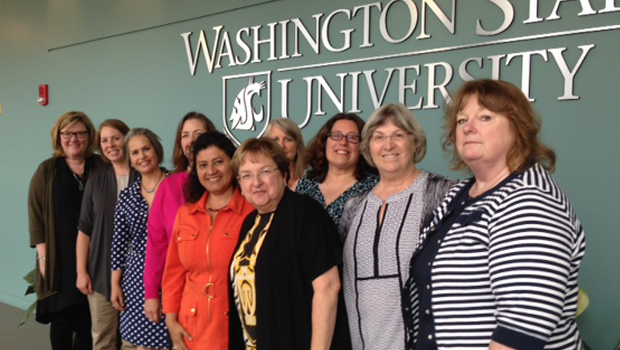Bringing diabetes self-care support to Eastern Washington’s Latino communities

Members of the Eastern Washington Community Advisory Board for GHRI’s project to build primary care support for diabetes self-management recently met at Washington State University offices in Spokane.
Katherine Newton, Nora Coronado, and Ileana Ponce-Gonzalez took a summer road trip around Washington state, but not to the wine country or state parks. They visited leaders of community health organizations in Yakima, Othello, and Spokane to learn how to help them guide people with diabetes in healthy everyday decisions.
“The choices that people with type 2 diabetes make every day—what to eat, whether to exercise, and when to take medications—directly affect their risk of complications like heart disease, kidney failure, and blindness,” says Katherine M. Newton, PhD, Group Health Research Institute (GHRI) senior investigator and director of research & external affairs.
Regular doctor visits are important for controlling diabetes, but so is daily self-monitoring of diet, activity, and blood sugar. An effective way for people with diabetes to learn these everyday skills is the Diabetes Self-Management Program, developed and tested in Spanish and English at Stanford University. The program is six weekly workshops from trained peer leaders who have diabetes themselves. Dr. Newton knew about this program and she knew of communities that could benefit from it.
The opportunity to support the workshops in communities that need them came from the Washington State Attorney General’s office, which had money from a consumer protection lawsuit specifically to help people with diabetes. In 2013, Dr. Newton and GHRI Senior Investigator and Group Health Medical Director of Research Translation Robert J. Reid, MD, PhD, were granted more than $1.4 million to help community organizations offer self-management training to clients with diabetes. Dr. Newton started by hitting the road, along with the project’s community liaison, Nora Coronado, MSW, and its senior advisor, Ileana Ponce-Gonzalez, MD, MPH.
For the first year of the three-year grant, Dr. Newton and her research team traveled, networked, and did outreach to connect with community health organizations in areas with the greatest need for diabetes programs. For example, the team actively sought partners in Central and Eastern Washington to reach Latino populations, who have 1.7 times the diabetes diagnoses as non-Latino whites. Team members talked with community leaders and residents to learn about the current state of diabetes self-management support and barriers such as language, transportation to workshops, and childcare.
The research team established two Community Advisory Boards, one in Central and one in Eastern Washington. Board members are local clinic administrators, primary care providers, diabetes specialists, patient advocates, and people with diabetes. Project co-investigator Dori Rosenberg, PhD, MPH, GHRI assistant investigator, says, “We’ve learned a lot from the advisory boards. We thought we would coordinate the programs from GHRI in Seattle, but our board members taught us the importance of local ownership through onsite program coordinators.”
Community input is also directing efforts to ensure that the project has a long-term impact. For example, clinics expressed concern that patients will have to pay for workshops because unlike Group Health, many insurance plans don’t cover them. To overcome this barrier, the team is advocating in Washington state for broader health insurance coverage of diabetes self-management training. Project Manager Lisa Temposky says, “We’re focusing on sustainability—making sure the programs continue after the grant ends.”
For the next project phase, the team is accepting funding applications from community organizations and clinics to be the first to participate in this project by offering the self-management program to clients. Dr. Newton’s latest trip around Washington was to answer questions about the program and the application process. “It’s so educational to see the clinics in action,” she says. “They’re very busy already, working hard to offer great services. I could see how much they need and want our program, but also how much it will take to add it to their schedules.” Some of the activity at community clinics is related to initiatives from the Affordable Care Act, which increases support for safety-net clinics and federally qualified health centers to strengthen local primary care. “Everyone recognizes diabetes self-management as a need,” says Dr. Rosenberg, “but the clinics are already at their capacity. We’re working with them to find ways to integrate this important service into their patient care.”
Looking back on the last year, Dr. Newton says the main lesson has been the importance of relationship-building. “You have to go to the clinics and spend face-to-face time with them,” she said, “listening to their needs and expectations and seeing what they deal with every day.” The team is confident the project will reach its goal of helping nearly 5,500 people in Washington, however, because of the potential rewards for employers, local health clinics, and the community. “The payoff,” says Dr. Rosenberg, “is that employees, clinic patients, and family members will be healthier.”
Principal investigators of the Integrated Diabetes Self-Management Support in Primary Care project are Drs. Newton and Reid. Co-investigators are Dr. Rosenberg and Paul Fishman, PhD, GHRI senior investigator; Michael L. Parchman, MD, MPH, GHRI senior investigator, Director, MacColl Center for Health Care Innovation; Barbara Trehearne, RN, PhD, Group Health vice-president, Primary Care; and David McCulloch, MD, FRCP, Group Health medical director, Clinical Improvement. Dr. Ileana Ponce-Gonzalez, senior advisor for scientific and strategic planning with the Migrant Clinicians Network and a clinical consultant with the federal Bureau of Primary Health Care, recently joined the project team as senior advisor for community liaison and outreach.


